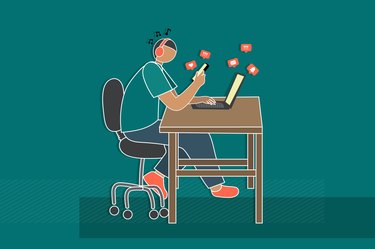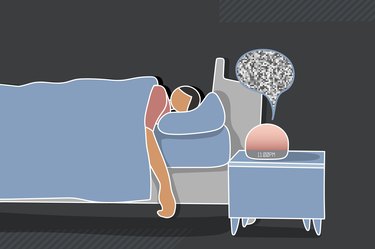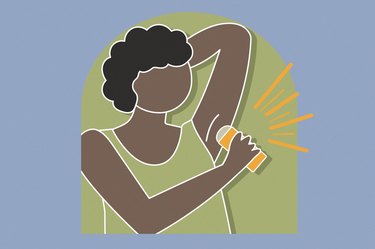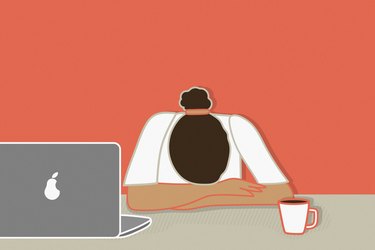
Most likely, you've heard multitasking is to be avoided — this is common health wisdom, like the importance of hydrating throughout the day and avoiding screens before bed.
"It's just not a good idea to multitask," says David A. Merrill, MD, PhD, adult and geriatric psychiatrist and director of the Pacific Neuroscience Institute's Pacific Brain Health Center at Providence Saint John's Health Center in Santa Monica.
Video of the Day
Video of the Day
But for most of us, multitasking might be common: We cook dinner to the sounds of the radio or a podcast; shuffle between email, projects and chat programs at work; and generally engage in countless other instances of doing two (or several) things at once.
If you opt to multitask — or are forced to do so because of the realities of our modern-day world — what exactly happens in your brain?
We spoke to neurologists to discover the effects of multitasking and got their tips on how best to manage when you can't avoid it.
What Happens When You Multitask?
"The human brain is not designed to do two things at once," Dr. Merrill says. "When you do that, there's a cost." Namely, you'll decrease your ability to encode and remember new information.
Essentially, if you try to perform two (or more) tasks at a time, your brain split its efforts, says Allison Brager, PhD, a neuroscientist, sleep specialist for Molecule and author of Meathead: Unraveling the Athletic Brain. That generally leads to worsened abilities with each task.
Here's an example: Imagine you're out picking berries, while also on guard for threatening wild animals. "The more you pay attention to try to get the lion to not eat you, the less rapidly and the less accurately you'll be able to gather berries," Dr. Merrill says. It's more effective, he notes, if you can pair up, with one person watching for ferocious creatures and another picking berries.
"Even criminals work this way," Dr. Merrill jokes. "You have one person to look out, and one person committing the crime."
Here are some of the effects that can occur as a result of multitasking:
1. You’ll Be Less Productive and Effective
There's a cost that accompanies switching between tasks, Dr. Merrill says. That's true whether it's being on guard against wildlife and picking berries or responding to a Slack message while talking to your roommate.
"The rules of picking berries are different from the rules of noticing whether or not there's a lion," Dr. Merrill says. Your brain focuses on first one task, then the other. "When you switch back and forth, there's a time cost," he says.
This is known as dual-task costs. With more complex tasks, and with tasks that are unfamiliar, switching from one to another takes more time, according to the American Psychological Association (APA).
Multitasking can decrease efficiency as well as performance. For example, if you're texting while doing something else, like making a cake or driving a car, you'll do a worse job. You may forget an ingredient in your cake, or drive erratically.
Multitasking can be hard on relationships, too. If you're playing Wordle while talking to your spouse, you may not fully take in what they're saying, leading to tension when you don't pick up the milk on your way home the next day.
2. You’ll Remember Less
If you're looking to take in something new — or just remember what your friend said over dinner — multitasking can prevent those efforts.
"Divided attention reduces encoding, and encoding is the first step in remembering," Dr. Merrill says.
3. You May Feel Stressed
When you're at work, and you've got four things to do, just the thought of this pile of tasks — let alone the possibility that your boss may swing by and add three more items to your list — can cause anxiety, says Joseph Kassa, DO, neurologist at the Michigan Institute for Neurological Disorders (MIND).
It could also make you less efficient, he says — instead of completing a task, you'll be thinking about all the items on your to-do list.
Are There Any Long-Term Effects?
As you’ve seen, there are a slew of short-terms effects from multitasking, from reduced productivity to frustrating people around you. But multitasking itself isn’t known to have any long-term effects, Dr. Kassa says.
How to Avoid Multitasking — or Limit Its Negative Effects
It's hard to avoid multitasking. The deck's stacked against us, with the world — and the work world in particular — structured to reward immediate responses, Dr. Merrill says.
"That's at odds with deep productivity and deep creativity," Dr. Merrill says. You may not be able to curtail multitasking completely, but you can limit it somewhat — and be strategic about when you multitask — with these tips.
1. Own Up to Multitasking
If you're multitasking, you may make silly errors. While you can put in guardrails to prevent errors, it can be helpful to just acknowledge limitations, Brager says.
She points to the common disclaimers people append to emails sent on phones that apologize for misspellings and small mistakes.
2. Set Boundaries and Block Your Time
Turn off your notifications, Dr. Merrill recommends — no more buzzing from news alerts on your phone, dings as texts come through and pings to announce chats or emails.
It can also help to budget your time: Instead of checking your email as it arrives, block off a few times a day to devote to your inbox.
Set limits with response times, Dr. Merrill recommends. In the early days of email, people used to expect a response within a couple of days. Now, people expect responses in hours. Take more time, and avoid training yourself and your community to anticipate an immediate response, he says.
Related Reading
3. Know Your Limits
Many people have jobs that require some level of multitasking — think of nurses and doctors in an ER, waiters or even office workers who are required to use chat programs.
Some people might be better at juggling and won't experience a marked decrease in performance, Dr. Merrill acknowledges. One older study describes these extraordinary folks as "supertaskers." The August 2010 study in Psychonomic Bulletin & Review had 200 undergraduates drive (in a driving simulator) while being asked to remember words and answer simple math questions. Only 2.5 percent of the participants performed the same whether they were just driving or driving while doing the other tasks.
For most of us, multitasking does lead to errors and diminishing productivity. And even people who may be adept at multitasking will eventually reach their limit.
"Every ER doctor can only have so many patients at once before they start not meeting the needs of the patients," Dr. Merrill says. That's true for waiters, too, as well as office workers who may tap out at, say, 10 Slack chats.
4. Try Caffeine
"One thing that could potentially improve your ability to multitask is caffeine supplementation," Brager says. Studies show that caffeine helps maintain vigilance and attention, she says.
Related Reading
5. Be Thoughtful About Tasks You Pair Together
Of course, we all multitask constantly. We fold laundry while watching TV, call our moms while doing the dishes and walk on treadmills while replying to emails.
These activities of daily life are easy, Dr. Kassa says; our brains can handle it. Harder tasks — and more of them — are a different matter.
"When it becomes more complex, our brains are only wired to really do one thing at a time, " Dr. Kassa says. Think of driving a car while holding a phone up to your ear so you can talk on it, he says. That's three tasks. If you can eliminate one task — holding the phone — by using a headset or car speakers, you make things less overwhelming for your brain, Dr. Kassa says.
As you choose when to multitask, and which tasks are involved, consider their complexity and their importance to you. If you binge TV while scrolling social media, you may not be able to recall plotlines or your friend's funny caption the next day. That's likely low stakes!
But some other tasks are the difference between death and survival, says Brager, who is in the United States Army (active duty). "If you're in an environment where your survival is threatened, your brain is automatically going to focus on the stimulus in the tasks that may or may not kill you," she says.
So, How Bad Is It Really to Multitask?
By multitasking, you're working against — not with — your brain.
"Your brain is programmed to do one thing at a time for the most part," Dr. Kassa says.
It can handle a few low-level tasks happening at once, but when you pile on more complex tasks, it cuts your efficiency. Multitasking becomes the path to errors and reduced productivity. Think of it as being like when you add one too many tabs to your browser window — nothing functions well.
If you have multiple things to do, Dr. Kassa has a recommendation: Take a deep breath, and take each item one at a time.
- American Psychological Association: "Multitasking: Switching costs"
- Psychonomic Bulletin & Review: "Supertaskers: Profiles in extraordinary multitasking ability"
- Psychopharmacology: "Caffeine improves reaction time, vigilance and logical reasoning during extended periods with restricted opportunities for sleep"
Is this an emergency? If you are experiencing serious medical symptoms, please see the National Library of Medicine’s list of signs you need emergency medical attention or call 911.



